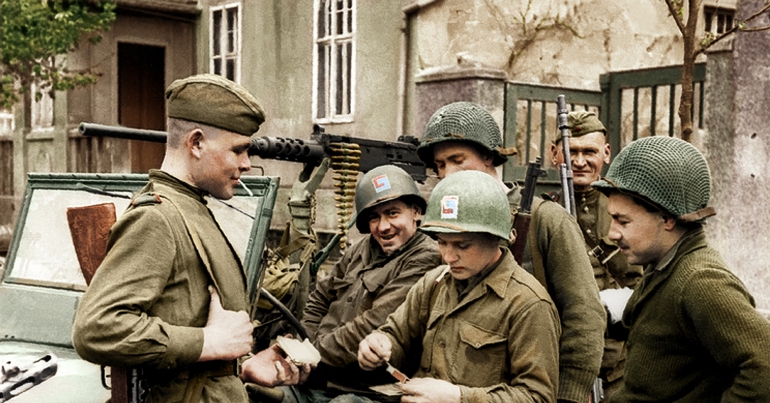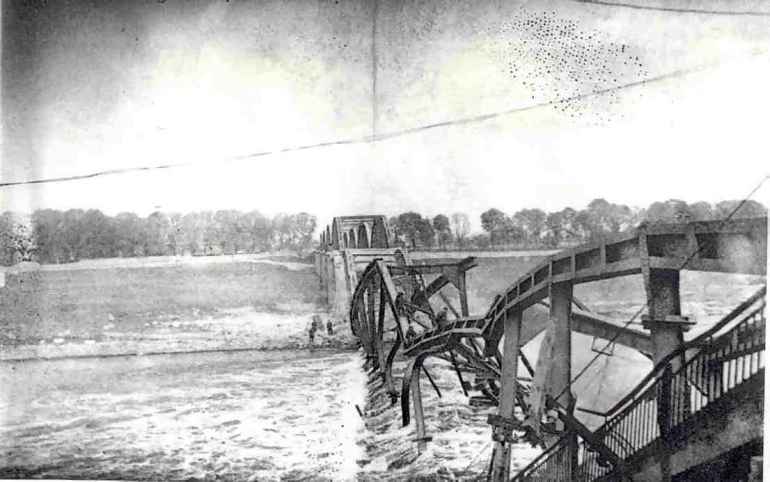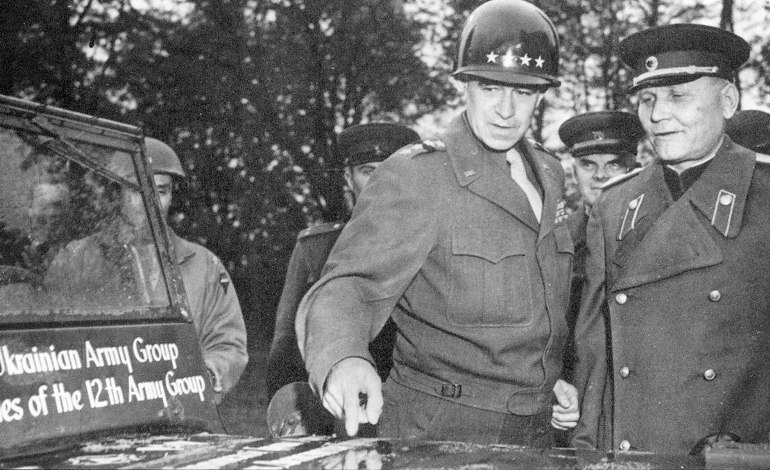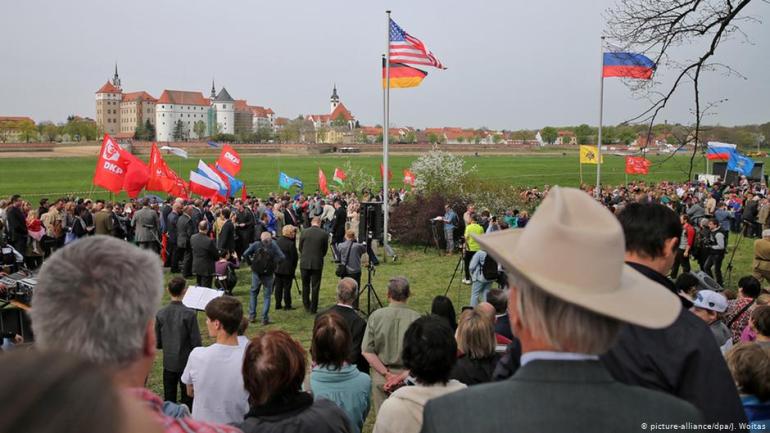
Reviving Spirit of the Elbe
/ Главная / Russkiy Mir Foundation / Publications / Reviving Spirit of the ElbeReviving Spirit of the Elbe
Sergey Vinogradov
A videoconference commemorating the 75th Anniversary of the Encounter of the Soviet and American armies at the Elbe River brought together historians, political experts, and military officers from a dozen countries of the world. The very first speeches refocused the teleconference bridge and turned it into discussion of current issues, such as the pandemic faced by the world, and the need to join forces in presence of a common threat.
Speakers from academic lecture halls and scientific libraries, those wearing space suits and Indian turbans, officers in military uniforms and re-enactors in gymnastyorkas (soldiers' service shirts), mayors of European cities and artists, from Moscow, Washington and German Torgau, where the USSR and US armies had met 75 years ago, urged to revive Spirit of the Elbe for development of mutual understanding between states and peoples.
The bridge over the Elbe
A conference on the occasion the 75th Anniversary of the Encounter at the Elbe was to be held in Torgau on April 25 - the major event involving historians and political experts was under preparation for several months. It was planned to discuss what role the allied assistance played in defeating fascism, what perception of military cooperation between Moscow and Washington is there in today's Russia and the USA, as well as how it impacts the current relationship between the two states.

Encounter at the Elbe (present-day colorisation). Photo credit: pikabu.ru
Speakers had prepared lengthy lectures and answers to possible responses from opponents. The videoconference lasted almost three hours; each speaker got 2-3 minutes only to say the most important thing that s/he wanted to say on the banks of the Elbe. The conference brought together more than a hundred participants from Russia, the USA, Great Britain, France, China, India, Denmark, Poland, Belarus and other countries. It was organized and moderated by Eduard Lozansky, President of The American University in Moscow, and Svetlana Smirnova, First Deputy Secretary General of the Eurasian Peoples' Assembly.
The first speaker was Kevin Ryan, retired US Army General. He thanked Russian and American veterans for serving their homelands in good Russian (at the beginning of the 2000s, he was a military attache of the US Embassy in Moscow).
"When American and Soviet troops reached Torgau in April 1945, the bridge over the Elbe had been destroyed by the Germans; it was a twisted mass of steel and wood, half drowned in the river," said the US general. “Military men of both countries made their way along remnants of the bridge toward each other, and it was a risky undertaking for them. But they overcame all obstacles. A new generation of Americans and Russians must understand the importance of maintaining ties between countries, even when our bridges are damaged. Today common threats are still there - I mean terrorism and coronavirus. We need not only courageous guys like our fathers were, but also brave leaders who are ready to get onto a broken bridge to restore ties.”

The very bridge over the Elbe in Torgau, 1945. Photo credit: 69th-infantry-division.com
The space sector has been one of a few areas where Moscow and Washington maintain bridges during the most difficult periods of bilateral relations. So greetings from the orbit were appropriate and expected by the conference participants. “This meeting is a symbol of the Allied Victory in World War II,” said Anatoli Ivanishin, a Russian cosmonaut. “Today, the world requires unity of spirit and common cause manifested at that historical moment as never before.”
“Successful cooperation between Russia and the USA in the field of space research can serve as a good role model for everyone, regardless of their age and profession,” said Ivan Wagner, another cosmonaut.
Children of the Victors
Seventy-five years is a long time, and many participants of those war events did not live to see the Anniversary celebrations. So testimonies of their children, who were entrusted their innermost memories, become increasingly important.
Natalya Koneva, daughter of the legendary Soviet Marshal Ivan Konev, participated in the videoconference. Soldiers of the 1st Ukrainian Front under his command met with the Americans at the Elbe.
“On the 10th Anniversary of the Encounter at the Elbe, my father received a letter from Joseph Polowski, an American soldier,” said Natalya Koneva. “I found the original letter; it had been in my father’s archive for many years. There are amazing words, and it seems to me, they sound very relevant today." Joseph Polowski wrote: “We, soldiers of both sides, vowed to do our best to build a better life based on goodwill, respect and peace between our countries.”
According to the Marshal’s daughter, to revive Spirit of the Elbe, the present generations shall be demonstrated the whole history of cooperation between the USSR and the USA during the Second World War. “We must spread this knowledge, show photographs and documentary films, share the memories of participants in those events,” says Natalya Koneva.” During the war, there was a battle for a righteous cause; so the whole world joined forces against evil and advocated elimination of fascism as an idea. And Spirit of Elbe remains relevant."
Marshal Konev’s granddaughter conveyed greetings to Joseph Polowski’s son, who also joined the conference from Chicago. “I am honored to be invited to this online conference,” said Joseph Junior. “It is important for us all to come together, despite the coronavirus pandemic. They are right when they say that crisis is also an opportunity. We must make every possible effort to turn all current crises into opportunities, unite people and shape new future. My father was a peace advocate. He fought in the war, and then he continued to fight for peace between the USA and the USSR for decades.”

Marshal of the Soviet Union Ivan Konev and US Army General Omar Bradley. Photo credit: booksite.ru
Shortly before the 75th Anniversary of the momentous event, an article was published by Andrei Baklanov, Deputy Chairman of the Association of Russian Diplomats and son of Colonel General Gleb Baklanov, who had been among the first ones to shake hands with American fellow servicemen at the Elbe.
“What spirit did our soldiers have preparing for a meeting with the allies? As remembered by my father and his fellow soldiers, there was joyful feeling of approaching end of the war, approaching Victory,” he wrote on the pages of International Affairs Journal. “There are rather few events in the history of relations between our country and the United States that are evaluated by us and the Americans from the same positive perspective, as an example of how to deal with partnership approach based on mutual respect. Such events include the encounter of Soviet and American allied forces in Germany, at the Elbe River, in April 1945."
Andrei Baklanov expressed his hope that Spirit of the Elbe would inspire current politicians in the United States and Russia.
Lesson for the present day
Representatives of many countries expressed their views on historical lessons of World War II and activities that could help ease tensions in the world. According to David Foglesong, a specialist in Russian-American relations at the University of New Jersey, bilateral relations could be improved through expansion of exchange programs. “In 1985, when we celebrated the 40th Anniversary of the Encounter at the Elbe, public diplomacy played a positive role, and expansion of exchange programs led to a decrease in tension between the countries,” he recalled.
His Russian counterpart, professor of American studies Vladimir Pechatnov said that the war years had been the glorious period in relations between the USSR and the USA. “Back then, the countries interacted very closely with each other, and they did it through diplomats, military personnel, public, and cultural figures,” he noted. “It was a time of great affinity and mutual respect. Leaders of the USSR, the USA and Great Britain had to put forth tremendous efforts to establish the Big Three during the war years. They were able to overcome ideological, political, personal likes and dislikes, and subordinate everything to the common cause. And this is an important learning experience for the present day.”
Martine Jolly, the mayor of the French city of Courcy, said that in France they were doing their best to maintain ties with Russia and other countries in the most difficult times. “Today there is one common enemy - the coronavirus, and we can unite fighting against it,” she said.
Dariusz Jaworski, the burgomaster of the Polish Witnica, shared that shortly before the 75th Anniversary of the Encounter at the Elbe he had planted a peace tree in the park-museum of his city. The tree will grow next to the border posts and barbed wire brought from the German-Polish border.
Zhou Liqun, Chairman of the Union of Chinese Entrepreneurs in Russia, recalled the cooperation between Beijing and Moscow during the Second World War and the important tasks of maintaining peace and strengthening cooperation. “Once more we are fighting together against the coronavirus, supporting each other,” he said. “And we will definitely win. United we stand.”

Meeting in Torgau on the occasion of the 70th Anniversary of the Encounter at the Elbe, 2015. Photo credit: dw.com
Dalbir Singh, representative of India, co-chair of the Eurasian Peoples' Assembly, believes that today the world is at the crossroads and faces many challenges. “Current level of trust between nations is very low,” he said. “If we follow Spirit of the Elba and be motivated by it, we will see improvements. We need to communicate more, share experiences, and study each other's diversity. In other words, we need to be closer to each other.”
“To be honest, I was taught to dislike Russians since childhood,” admitted Ron Ridenour, a historian from Denmark, in the beginning of his speech. “In my youth, I served in the US Army, and our briefings were specifically devoted to how evil Russians were. No one wondered who exactly the Russians were. And no one remembered the oath at the Elbe. You know, my hero is Yuri Gagarin. When he accomplished his feat and was the first to go to space, the Americans were busy trying to take over Cuba."
Anna Kaunert, an activist from Germany who had participated in the preparation of the anniversary celebrations at Torgau, also came online and shared that participants from different countries were expected at the Elba. “Flags of the Soviet Union and the United States fly over the Elbe,” she said. “I would like to convey you greetings from our burgomaster and other Torgau residents who will lay flowers at the monument to the 75th Anniversary of the Encounter at the Elbe. The city is ready to welcome guests for the anniversary celebrations, and we hope that they will take place in the fall or next year.”
Anna works as a teacher and does her best to make schoolchildren understand the importance of history lessons and the danger of misrepresentation of history. According to her, every year Russian and American schoolchildren come to Torgau as part of exchange programs, and they take Spirit of the Elbe back home with them. They are the future.
New publications

 Mikhail Kalatozov, a director who transformed the world of cinematography in many ways, was born 120 years ago. He was a Soviet film official and a propagandist. Above all, he was capable of producing movies that struck viewers with their power and poetic language.
Mikhail Kalatozov, a director who transformed the world of cinematography in many ways, was born 120 years ago. He was a Soviet film official and a propagandist. Above all, he was capable of producing movies that struck viewers with their power and poetic language.  Ukrainian authorities have launched a persecution campaign against the canonical Ukrainian Orthodox Church (UOC), the biggest one in the country's modern history. Over the past year, state sanctions were imposed on clergy representatives, searches were conducted in churches, clergymen were arrested, criminal cases were initiated, the activity of the UOC was banned in various regions of the country, and monasteries and churches were seized.
Ukrainian authorities have launched a persecution campaign against the canonical Ukrainian Orthodox Church (UOC), the biggest one in the country's modern history. Over the past year, state sanctions were imposed on clergy representatives, searches were conducted in churches, clergymen were arrested, criminal cases were initiated, the activity of the UOC was banned in various regions of the country, and monasteries and churches were seized.  When Nektary Kotlyaroff, a fourth-generation Russian Australian and founder of the Russian Orthodox Choir in Sydney, first visited Russia, the first person he spoke to was a cab driver at the airport. Having heard that Nektariy's ancestors left Russia more than 100 years ago, the driver was astonished, "How come you haven't forgotten the Russian language?" Nektary Kotlyaroff repeated his answer in an interview with the Russkiy Mir. His affinity to the Orthodox Church (many of his ancestors and relatives were priests) and the traditions of a large Russian family brought from Russia helped him to preserve the Russian language.
When Nektary Kotlyaroff, a fourth-generation Russian Australian and founder of the Russian Orthodox Choir in Sydney, first visited Russia, the first person he spoke to was a cab driver at the airport. Having heard that Nektariy's ancestors left Russia more than 100 years ago, the driver was astonished, "How come you haven't forgotten the Russian language?" Nektary Kotlyaroff repeated his answer in an interview with the Russkiy Mir. His affinity to the Orthodox Church (many of his ancestors and relatives were priests) and the traditions of a large Russian family brought from Russia helped him to preserve the Russian language.

 The leaders of the Friends of the Great Russia cultural association (Amici Della Grande Russia) in Italy believe that the Western policy of abolishing Russian culture in Europe has finally failed. Furthermore, it was doomed to failure from the beginning.
The leaders of the Friends of the Great Russia cultural association (Amici Della Grande Russia) in Italy believe that the Western policy of abolishing Russian culture in Europe has finally failed. Furthermore, it was doomed to failure from the beginning.  Name of Vladimir Nemirovich-Danchenko is inscribed in the history of Russian theater along with Konstantin Stanislavski, the other founding father of the Moscow Art Theater. Nevertheless, Mr. Nemirovich-Danchenko was a renowned writer, playwright, and theater teacher even before their famous meeting in the Slavic Bazaar restaurant. Furthermore, it was Mr. Nemirovich-Danchenko who came up with the idea of establishing a new "people's" theater believing that the theater could become a "department of public education."
Name of Vladimir Nemirovich-Danchenko is inscribed in the history of Russian theater along with Konstantin Stanislavski, the other founding father of the Moscow Art Theater. Nevertheless, Mr. Nemirovich-Danchenko was a renowned writer, playwright, and theater teacher even before their famous meeting in the Slavic Bazaar restaurant. Furthermore, it was Mr. Nemirovich-Danchenko who came up with the idea of establishing a new "people's" theater believing that the theater could become a "department of public education."  "Russia is a thing of which the intellect cannot conceive..." by Fyodor Tyutchev are famous among Russians at least. December marks the 220th anniversary of the poet's birth. Yet, he never considered poetry to be his life's mission and was preoccupied with matters of a global scale. Mr.Tyutchev fought his war focusing on relations between Russia and the West, the origins of mutual misunderstanding, and the origins of Russophobia. When you read his works today, it feels as though he saw things coming in a crystal ball...
"Russia is a thing of which the intellect cannot conceive..." by Fyodor Tyutchev are famous among Russians at least. December marks the 220th anniversary of the poet's birth. Yet, he never considered poetry to be his life's mission and was preoccupied with matters of a global scale. Mr.Tyutchev fought his war focusing on relations between Russia and the West, the origins of mutual misunderstanding, and the origins of Russophobia. When you read his works today, it feels as though he saw things coming in a crystal ball...